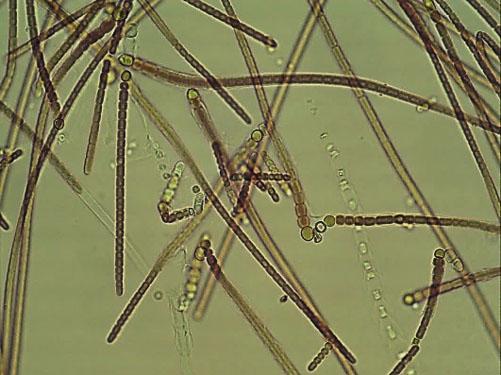
Credit: Masaki Ihara Ph.D., Interdisciplinary Cluster for Cutting Edge Research Institute for Biomedical Sciences, Shinshu University
Algae holds a lot of untapped potential for use in industry. So far algae has provided invaluable nutrition in the health food sector but has struggled to be competitive against petroleum-derived chemical production. Algae is favorable to petroleum from an environmental standpoint but the production cost of culturing, collecting, extracting and refining adds up to make it too expensive for practical use. There is a need to improve production efficiency to reduce the cost of algae derived products in order for them to be a viable alternative to petroleum-derived products.
A research team led by Alice Uchida and Masaki Ihara of Shinshu University succeeded in developing a method of cultivating microalgae by solving three issues of cultivation; collection/recovery of compounds and extraction/purification of products with this new method. First, it was necessary not to kill the algal cells during extraction. By preserving the algae, there is no need to cultivate and multiply the algae. Secondly, the algae they chose naturally gather together for ease of collection. Thirdly, the compounds wanted for harvest; polysaccharides (carbohydrates) and phycobiliproteins are released outside of the algae and bound to the cell surface. There is no need for a solvent for extraction or purification, dramatically simplifying and decreasing the cost of processing. This non-destructive continuous milking system is a practical and effective method of algae-derived chemical production.
In the beginning of the study, the researchers struggled to find a type of algae that could withstand mechanical shearing. They were not sure such an algae existed. However, after an extensive search, they were able to find the Tolypothrix filamentous cyanobacteria and were able to cultivate it continuously for 2 years with little cell damage despite mechanical shearing of the compounds bound to the cell surface. They grew the algae in non-sterile agricultural water and performed 87 day milking cycles which yielded 90 to 140 mg/L of extracellular carbohydrates every 3 weeks. Phycobiliproteins are currently in demand for food additives and cosmetic applications.
The Ihara lab hopes to enable petroleum-based products to be replaced by algae-derived products that inflict less strain on the environment. In order to do so, algae production needs to happen on a much, much larger scale. He continues to look for tough algae that can survive in a variety of environments. He hopes to be able to collaborate with researchers from a variety of fields including fermentation engineering, chemical engineering, polymer chemistry- specifically algal biomass conversion technology, environmental and forest conservation studies in order to study the effects of large-scale algae culture on the environment.
The realization of a post-petroleum society would cause the landscape to be altered, similar to how rice cultivation changed the landscape of Japan through the introduction of rice paddy fields. Although the researchers are optimistic about the future potential of algae, they proceed with caution to consider all the potential effects of change.
###
For more information on the study, please read Production of extracellular polysaccharides and phycobiliproteins from Tolypothrix sp. PCC7601 using mechanical milking systems in the journal Algal Research.
This research was supported by Japan Society for the Promotion of Science (JSPS) Grants-in-Aid for Scientific Research (KAKENHI) Grant Number JP17K07717.
Media Contact
Hitomi Thompson
[email protected]
Related Journal Article
http://dx.




